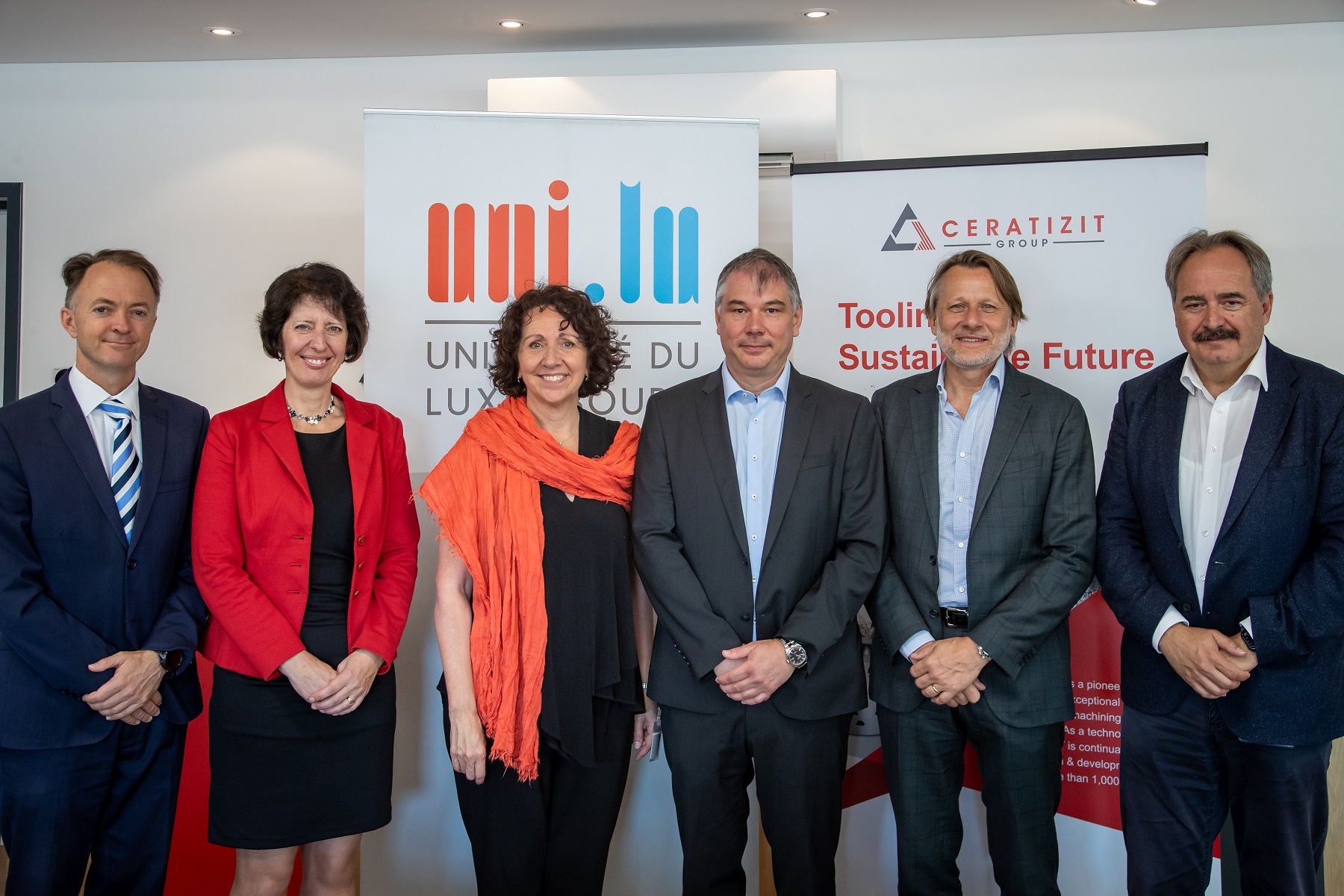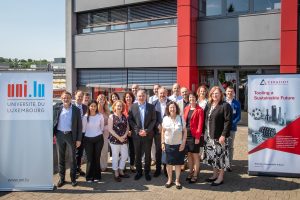The University of Luxembourg will host a ‘CERATIZIT Chair in Hard and Advanced Materials’ to strengthen research and development in pioneering materials and manufacturing technologies. This agreement is the last in a long track record of collaboration between CERATIZIT and the University of Luxembourg.
This partnership fostering academic excellence and industrial innovation will benefit both the University through novel engineering skill sets for the talents of the future and CERATIZIT through access to cutting-edge research and emerging talent. Furthermore, the Chair will push forward the industrial development of Luxembourg in high value materials, a critical capacity for the country where more than 32,000 people work in manufacturing.
“Local and global conditions make the creation of the CERATIZIT Chair timely”, said Prof. Ralph Useldinger, Chairholder of the CERATIZIT Chair.
‟ Advanced materials and manufacturing technologies can further enhance the circularity in critical raw materials and contribute to European efforts to diversify the EU’s supply of critical raw materials used in multiple industries, such as manufacturing, medical, transport, energy and construction.”
The CERATIZIT Chair, hosted within the Department of Engineering at the Faculty of Science, Technology and Medicine, will include two doctoral candidates and two postdoctoral researchers that will contribute to existing academic programmes at the Bachelor, Master and doctoral levels, with an emphasis on the practical needs of the industry. Adding to the outstanding infrastructures of the University, such as engineering laboratories and HPC cluster, laboratory equipment at the CERATIZIT facilities in Mamer, Luxembourg, will also be available for dedicated teaching and research.

From left to right: Bradley Ladewig (Uni.lu), Melissa Albeck (Ceratizit), Marie-Hélène Jobin (Uni.lu), Ralph Useldinger (Uni.lu), Frank Thomé (Ceratizit), Uwe Schleinkofer (Ceratizit)
Prof. Ralph Useldinger grew up just a few kilometres away from the University’s Kirchberg campus. He studied chemistry in Reims, France, before working in the research and development department at CERATIZIT in Mamer. He pursued his studies at TU Wien, dedicating his PhD to cutting tool materials. Prof. Ralph Useldinger has held several R&D manager positions within the CERATIZIT Group, where he was responsible for material analytics, development, and testing of new materials. Ralph is also actively involved in various scientific committees and foundations that promote science among younger generations. Since 2023, CERATIZIT is also working in collaboration with the Interdisciplinary Centre for Security, Reliability and Trust (SnT) of the University of Luxembourg, to investigate how artificial intelligence and data science can be efficiently applied to their production lines, with the aim to improve performance, reliability and sustainability.
“Consistent research, development, and innovation are necessary to ensure the materials, technologies, manufacturing and products are best in class”, said Frank Thomé, Member of the Executive Board of CERATIZIT. “This relies on a stable, highly-educated and highly-skilled workforce, in particular of scientists and engineers, which is why we have maintained a long relationship with the University of Luxembourg, including the creation of this Chair”.
“Supporting and strengthening the local high-value manufacturing sector requires continuous innovation and a solid pipeline of talent, both of which will be strengthened through the establishment of the CERATIZIT Chair”, said Marie-Hélène Jobin, Vice Rector for Partnerships and International Relations.
About CERATIZIT
For over 100 years, CERATIZIT, which is part of the Plansee Group, has been a pioneer in developing exceptional hard material solutions for machining and wear protection. The private company, with registered offices in Mamer, Luxembourg, develops and produces highly specialised cutting tools, indexable inserts, rods made from hard materials and wear parts. CERATIZIT is the global market leader in various application segments and successfully develops new carbide and cermet grades, such as for wood and stone working. With more than 7,000 employees at more than 30 production facilities and a sales network with over 50 branches, CERATIZIT is a global player in the carbide industry. The company’s international network includes the subsidiaries AgriCarb, Stadler Metalle, and Xceliron as well as the joint venture CB-CERATIZIT. The technology leader is continually investing in research and development and holds more than 1,000 patents. Innovative hard material solutions from CERATIZIT are used in various sectors, including mechanical engineering and toolmaking, in the automotive and aerospace industries and in the oil, gas and medical industries.
About the University of Luxembourg
The University of Luxembourg is a young research-intensive institution. Interdisciplinarity in research and teaching is key to the University’s approach to addressing tomorrow’s societal challenges. Embedded in Luxembourg’s diverse and multicultural society, the University offers a welcoming, multilingual environment, where students and researchers from around the world feel at home. Its compact size fosters close interaction between students and lecturers, creating a personal atmosphere. Internationally recognised research drives innovation in digital transformation, health, and sustainable development. Scientific progress is supported by cutting-edge infrastructure and a national commitment to education, research, and innovation. The dynamics of a still young university offer rare potential and scope for exploring new ideas.
